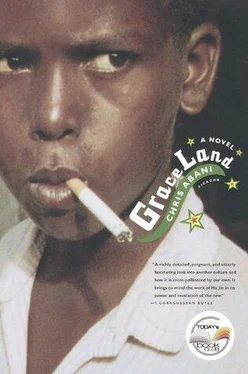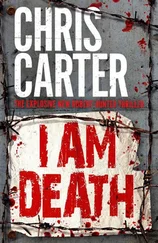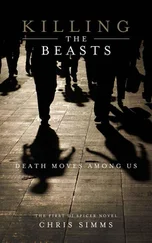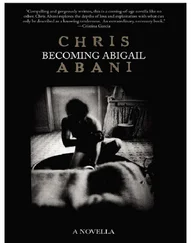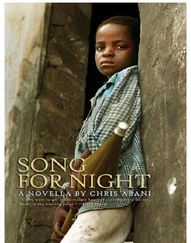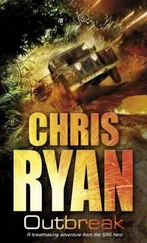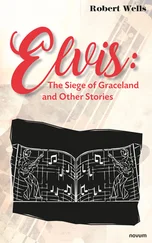“Come on, scram!” Able-to-do said to Elvis. “Do you see any other children here?”
Elvis hesitated. A record store about a block up from them was open late, and two huge speakers propped its doors open, throbbing loudly with Isaac Hayes singing the “Theme from Shaft .”
“Well, well. Dis one has heart,” Confusion said.
Elvis glowed. Confusion was his true hero. Of all the people he knew, Confusion was the only one who dared to try and make a living at something he loved. That, coupled with the way these boys adopted such confrontational nicknames, defying a culture where your name was selected with care by your family and given to you as a talisman, was the thing rebellion was made of, as far as Elvis was concerned.
“He will soon have a broken head. Heart or no heart, he should not be here,” Able grumbled.
“Don’t be so hasty, Able. Everyone has deir uses,” Confusion said. Turning to Elvis, he held out some money. “Go over dere and get us a couple of beers.”
Elvis headed off in a trot.
“And make sure dey are cold!” Able shouted after him.
When Elvis came back with the sweating green bottles, Confusion let him keep the change. He watched, fascinated, as they both opened their bottles with their teeth. They were deep in an argument about the merits of John Wayne versus those of Actor. Confusion was squarely on the side of Actor, whom he believed to be a true hero.
Elvis loved Actor too, and thought he had the best role: part villain, part hero. Women preferred him to John Wayne and men wanted to be him. His evil was caddish, not malicious, and Elvis knew that though most people dared not step out of the strict lines of this culture, they adored Actor. He was the embodiment of the stored-up rebellions in their souls. But as with all things here, even these archetypes were fluid. Halfway through a James Bond film, Dr. No could change from Actor to John Wayne in the viewer’s minds, and James Bond could become Actor.
“Dat John Wayne is suspect O! Hah! Me I think he is just establishment guy O!” Confusion said.
“How can a rogue be a hero?” Able-to-do countered. “In your small town or dis one, eh? Impossible. Anyway, John Wayne always wins.”
“No sir. How many bags full? None. Actor is simply de best. And remember, in every cinema, average bad guy and even John Wayne can die. But Actor cannot die.”
From the sound of the crowd in front of the makeshift screen, Elvis figured the main feature was about to start and scampered off. He scanned the crowd. The audience for the most part comprised those of the working class that didn’t find their release in religion: motor-park porters and touts, market men and women, the usual motley mix that was the large yet invisible heart of any city. The mostly illiterate audience was unable to read subtitles, but Elvis knew they did not let that ruin their fun. They simply invented their own stories, resulting in as many versions as there were people. Still, for him, it was magical.
The screens were dirty, hole-ridden, once-white bedsheets stretched between two wooden poles. The projectors, archaic and as old as many of the silent stars, sounded like small tanks. Moody, they tended to burn films at the slightest provocation, melting the plastic into cream-and-brown cappuccino froth. They vibrated so badly, the picture often blurred and danced insanely from side to side, sometimes spilling out onto a nearby wall.
At first, Elvis found it was dizzy work just trying to keep focused, until he learned that the popular trick was to sway from side to side while squinting off to the left. Barring the occasional bout of motion sickness, this worked quite well, and Elvis often wondered what it would be like to stand above and look down. He was sure the crowd made quite a sight: hundreds of people swaying from side to side, chattering away like insane birds, worshiping their new gods. They drowned out the commentary provided by the projectionist, who, undeterred, continued his litany on a battered megaphone.
As the film opened, Elvis read the title under his breath. The Good, the Bad and the Ugly . He smiled. This was a good one, plenty of action, though it started slowly, with two men waiting for a long time, one of them occasionally glancing at his watch, before shooting at each other. It didn’t seem like a terribly efficient way to kill someone. As soon as the last note of the watch died down, the projectionist was off:
“Actor is shooting John Wayne Wayne has dodged Oh No! Actor is down actor is down actor’s horse is down Oh No! John Wayne is in action John Wayne is a powerful medicine man He cannot be killed by bullets Oh Look! Indians are running running with many cutlasses and knives bows and arrows they are dodging bullets too as Cowboys fire them …”
The projectionist’s monologue would have been the same if it were an Indian movie, except of course the characters and the stories were different, most of the time anyway. But on the nights the projectionist got drunk, genies rode horses in pursuit of cow-rustling mermaids, and Ganesh sported six-shooters and the name John Wayne, while the Duke morphed into Krishna or the big-belt-buckled, flared-pant-bottomed star of one of Bollywood’s finest productions. Elvis tried to smile, but the projectionist was so loud, he annoyed him. Suddenly, all around him, the audience’s voices rose in argument. Here we go again, he thought.
“What do you mean she poison him? I say she is a witch. Witches don’t just poison ordinary poison, dey use magic poison.”
“Shut up! You always like to show you know something even when you don’t.”
“Keep quiet! Some of us are listening!”
“Listening? To what? Look at dis old goat! Who is talking to you?”
“Goat! Where is de goat? Are you confusing dat horse with a goat? I don’t see any goat on de screen.”
“See Actor, see Actor!”
“Dat’s not Actor, dat’s John Wayne.”
To Elvis, the plot lines were simple and were about the eternal struggle between the good of John Wayne and the evil of the villain, known simply, mysteriously yet profoundly as Actor. John Wayne acting as the villain in a film was Actor, and Clint Eastwood as sheriff was John Wayne. These films showed another aspect of that eternal war Father Macgettrick told them was being fought daily between the fallen angels led by Lucifer and the army of Christ, commanded by the armor-wearing, sword-wielding Archangel Michael. And just as in that story, the hordes of demons were dark-skinned.
Running the length of the motor park was a low cement wall where Elvis and his friends usually sat smoking and trying out conversations from the films. American English was exotic and a treat for the tongue, unlike the stricter grammar of England’s English, which they learned at school. Whistling a tune from The Good, the Bad and the Ugly , Elvis strolled over and took his place on the wall.
“Elvis, enjoy de film?” Hezekiah asked, passing him a cigarette. Elvis accepted it in spite of the lit one smoldering between his fingers.
“‘Darn these here rustlers.’ That projection man, why must he talk even when the film has sound, eh? ‘Shuh likes you, Annie,’” he nodded, sucking on the cool menthol smoke.
“Yup,” Titus agreed. “Rawhide. ‘Reach for it, sonny.’ You know dese people don’t hear American.”
They puffed and squinted off into the night, afraid of being caught smoking by the adults.
“‘If you want to shoot, shoot, don’t talk,’” Obed said, getting up and walking off.
“Yup,” Hezekiah agreed.
Somehow it all made sense to them, like some bizarre pig latin. And there was a power in the words that elevated them, made them part of something bigger.
It was late as Elvis snuck up the back path to the house. Thankfully the window he had propped open with a dry cell was still ajar. As he approached, he thought it odd that all the lights were still burning. They ran on a generator that his father shut off when the nine-thirty news was over. After that, it was back to kerosene lanterns like everyone else.
Читать дальше
